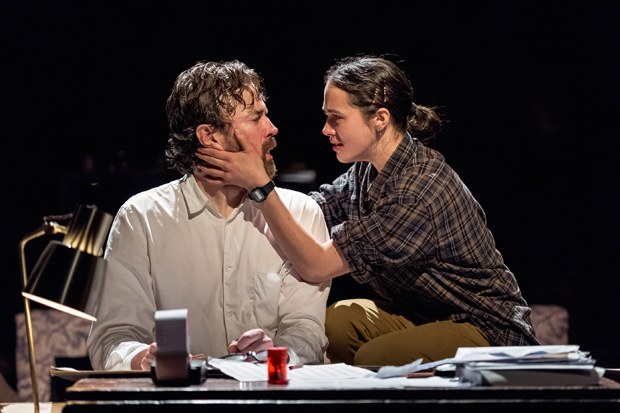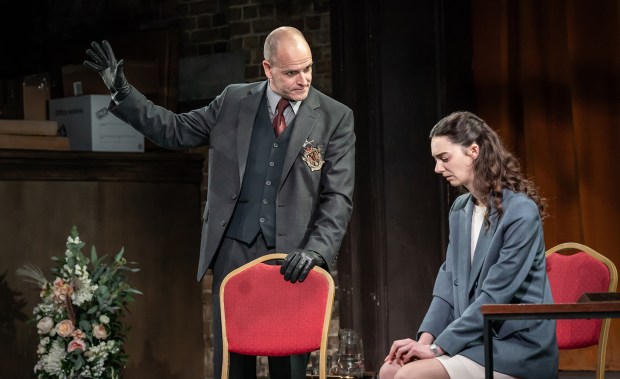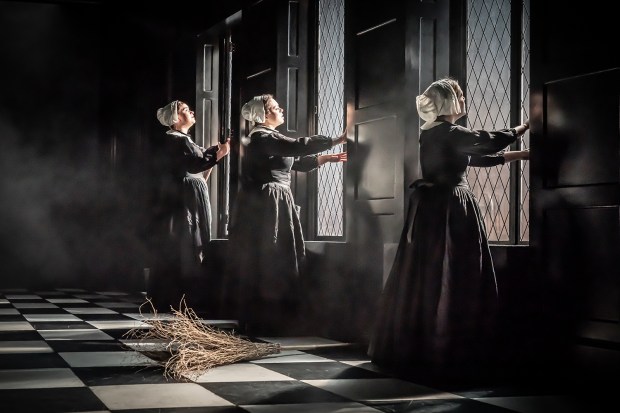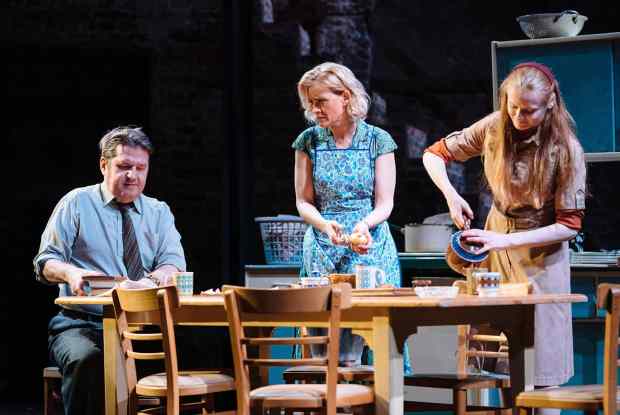Director Robert Icke has this to say of Chekhov’s greatest masterpiece: ‘Let the electricity of now flow into the old thing and make it function.’ He uproots ‘the old thing’ from its natural setting and drops it down in no-man’s land. It all feels modern. Aircraft buzz in the heavy summer air. A thunderstorm sets off a car alarm. English names have displaced their Russian originals. Telegin has turned into Cartwright. The childless but priapic Uncle Vanya has been renamed after a latex prophylactic, Uncle Johnny. Perhaps appropriately. These alterations create huge uncertainties of class, location and era. Who are these Bohemian dropouts swilling vodka in a nameless English shire without even a broadband connection to beguile their titanic boredom?
Uncle Johnny, played by dashing Paul Rhys in a hippie beard, strides energetically around the house like a rock star running a farm for a laugh. But why does he complain that his life over? He’s 47, according to this version, and therefore younger than the main contenders for the US presidency. And not just a bit younger. A generation younger. Yet he thinks he’s dying of old age. The eminent professor, who has battened off the estate for two decades, hasn’t a shred of solemnity or forcefulness about him. He’s a tie-less old baldy slobbing around in a pair of wellies. The idea that Uncle Johnny would have admired or even worshipped such a waddling dud destroys our interest and sympathy in either figure.
All Chekhov’s brilliant and visionary characterisation is reduced to contemporary shorthand. Elena is a vacant Sloane. The doctor is a climate-change bore. Telegin is chippy folk singer. Sonya is a bolshie anarchist in combat trousers. But Sonya’s particular tragedy belongs to Chekhov’s era, not our own. It’s absurd to imagine that a modern woman without beauty or wealth would be condemned to a life of loveless sterility. Even so, Sonya, whose ugliness is remarked on by everyone, needs to be played by a buck-toothed fatso pushing 40. Here we have a svelte young brunette in her mid-twenties, Jessica Brown Findlay, whose striking Grecian profile would grace a banknote. And although giving this key role to a rising star may help things at the box office it deprives the play’s central motif, thwarted romance, of all its melancholy tunefulness. And then there’s the set. Award-winning conceptualist Hildegard Bechtler has crowbarred the play on to a mobile platform bounded by thick goalposts. The entire structure twirls in sweeping circles this way and that. But these gyrations destroy the sightlines during important scenes. A teapot passes across Sonya’s nose. Some cheese on a shelf eclipses the professor’s scowl. Elena’s clinch with the doctor is obscured by an upright that idles across one’s field of vision like an underpowered windscreen wiper.
Parts of the play are pleasing, and some are delightful and gripping, but only because the beautiful contours of Chekhov’s creation are still visible through the fog of Anglicised befuddlement. And Icke encourages his actors to express every last shred of emotion rather than holding something in reserve. At the end Uncle Johnny has a crying fit on Sonya’s shoulder. Here Rhys gives us his drama-school ‘weeping’: eyes screwed tight, jaw stretched into an anguished smile, head nodding up and down. Some in the audience were evidently moved by this kit-car version of Chekhov and I’m sure that newcomers to Russian drama will enjoy it hugely. Or at least the debris of it. I’m equally certain that youngsters have enough intellectual curiosity to watch Chekhov in its native soil rather than this Withnail-esque hothouse.
Feminism regards theatre as the ‘revising chamber’ of history. The dearth of female dramatists and the lack of juicy roles for women can be corrected by retrospective action. Writer Jessica Swale reimagines Nell Gwynn as a liberated modern woman, a plucky Cockney go-getter, who delights Restoration theatre with her saucy love ballads. Invited to become Charles II’s mistress, she declines and forces him to make her a better offer. Having captured his attention, she must balance the demands of politics with her personal desire to retain his exclusive affections.
This undemanding show scores well as a farcical romp and Gemma Arterton is on fine form as the eloquent, charming Nell. She’s ably supported by Michele Dotrice, who was once the nation’s darling as Betty in Some Mothers Do ’Ave ’Em. Playing Nan, an elderly serving wench, Dotrice gets huge laughs from unpromising lines such as ‘she’s a tart on an ’orse’. And she upstages the entire company as the percussionist in an improvised band. At the end her performance won her a richly deserved ovation. Dotrice was always a superb comedienne and here she reveals herself as something far greater, a physical clown whose mastery of her art is complete.
Got something to add? Join the discussion and comment below.
Get 10 issues for just $10
Subscribe to The Spectator Australia today for the next 10 magazine issues, plus full online access, for just $10.
You might disagree with half of it, but you’ll enjoy reading all of it. Try your first month for free, then just $2 a week for the remainder of your first year.














Comments
Don't miss out
Join the conversation with other Spectator Australia readers. Subscribe to leave a comment.
SUBSCRIBEAlready a subscriber? Log in